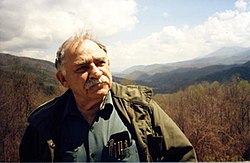Murray Bookchin, född 14 januari 1921 i New York City, New York, död 30 juli 2006 i Burlington, Vermont, var en amerikansk ekoanarkist[1], aktivist och politisk filosof.
| Murray Bookchin | |
 Murray Bookchin i Burlington | |
| Född | 14 januari 1921 New York, USA |
|---|---|
| Död | 30 juli 2006 (85 år) Burlington, Vermont |
| Nationalitet | |
Biografi redigera
Murray Bookchins var son till Nathan Bookchin och Rose Kaluskaya och växte upp i Bronx. Föräldrarna var judiska immigranter från Ryssland. Vid nio års ålder blev han medlem i en pionjärrörelse. Desillusionerad av rörelsens auktoritära natur lämnade han den några år senare. I skolan studerade han Marxism och gick med i Socialist Workers Party. År 1940 började han arbeta i ett gjuteri i Bayonne, New Jersey och engagerade sig i en fackförening.[2]
Bookchin övergick under 1960-talet till (sin version av) social anarkism, för att under 1990-talet växla över till att bara kalla sig för kommunalist. Bookchin anses ha bidragit till miljörörelsens framväxt med hans Our synthetic Environment (1962). Bookchin förespråkar kommunalism[3] – direktdemokratiskt konfedererade kommuner[4], decentralisering, småskalighet och relativt hög grad av självförsörjning[5]; därmed ligger hans tankegångar nära Peter Kropotkins och Gustav Landauers, med tillägget om ett socialekologiskt samhälle.
Institutet för socialekologi i USA är till stor del en avknoppning från Bookchins kritik av det kapitalistiska och industriella samhället, där utbildningar i socialekologisk hållbarhet erbjuds. Bookchin har även inspirerat en omsvängning inom PKK från Marxism–leninism till det som Abdullah Öcalan kallar "demokratisk konfederalism" som grundas på Bookchins idéer.[6]
Författarskap redigera
Bookchin, skrev under flera pseudonymer, såsom M.S. Shiloh, Lewis Herber, Robert Keller och Harry Ludd.[2]
Verklista redigera
Urval av Murray Bookchins böcker:[7]
- 1980 – Towards an Ecological Society
- 1982 – The Ecology of Freedom
- 1987 – The Rise of Urbanization and the Decline of Citizenship
- 1993 – Deep ecology & anarchism
- 1995 – Social anarchism or lifestyle anarchism
- 1995 – Re-Enchanting Humanity
- 1998 – The Spanish Anarchists
- 1999 – Anarchism, Marxism and the Future of the Left
- 2004 – Post-Scarcity Anarchism
- 2005 – The Third Revolution
- 2007 – Social Ecology and Communalism
- 2015 – The Next Revolution
- 2017 – The Philosophy of Social Ecology
- 2017 – Remaking Society
- 2017 – Urbanisation without cities
Översättningar till svenska redigera
- 1983 – Ekologi & anarki
- 2001 – Frihetlig socialistisk politik
- 2003 – Perspektiv för en ny vänster
Externa länkar redigera
Referenser redigera
- Den här artikeln är helt eller delvis baserad på material från tyskspråkiga Wikipedia, 18 december 2019.
Noter redigera
- ^ Murray Bookchin, Ecology and Revolutionary Thought (1964) An anarchist society should be a decentralized society, not only to establish a lasting basis for the harmonization of man and nature, but also to add new dimensions to the harmonization of man and man.
- ^ [a b] Bookchin”. Läst 27 februari 2020.
- ^ Murray Bookchin, What is Communalism?, The Democratic Dimension of Anarchism (2001) I wish to propose that the democratic and potentially practicable dimension of the libertarian goal be expressed as Communalism, a term that, unlike political terms that once stood unequivocally for radical social change, has not been historically sullied by abuse. Even ordinary dictionary definitions of Communalism, I submit, capture to a great degree the vision of a "Commune of communes" that is being lost by current Anglo-American trends that celebrate anarchy variously as "chaos," as a mystical "oneness" with "nature," as self-fulfillment or as "ecstasy," but above all as personalistic.
- ^ Murray Bookchin, What is Communalism?, The Democratic Dimension of Anarchism (2001) It is important to emphasize that libertarian municipalism--or Communalism, as I have called it here--is a developing outlook, a politics that seeks ultimately to achieve the "Commune of communes." As such, it tries to provide a directly democratic confederal alternative to the state and to a centralized bureaucratic society.
- ^ Murray Bookchin, Ecology and Revolutionary Thought (1964) A relatively self-sufficient community, visibly dependent on its environment for the means of life, would gain a new respect for the organic interrelationships that sustain it. In the long run, the attempt to approximate self-sufficiency would, I think, prove more efficient than the prevailing system of a national division of labor that prevails today.
- ^ ”Murray Bookchin and the Kurdish resistance”. ROAR Magazine. https://roarmag.org/essays/bookchin-kurdish-struggle-ocalan-rojava/. Läst 15 februari 2016.
- ^ ”Bookchin, Murray”. Libris.kb.se. Läst 4 mars 2020.